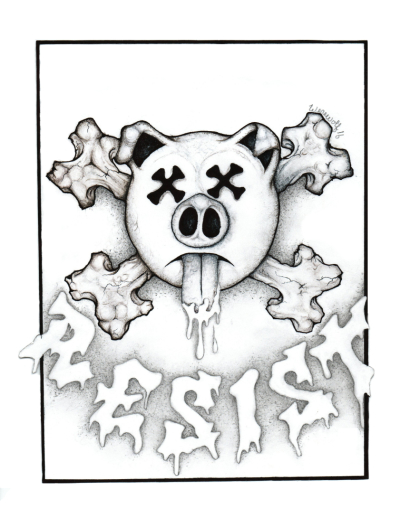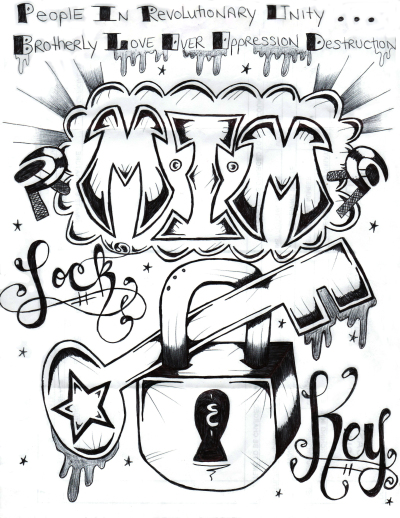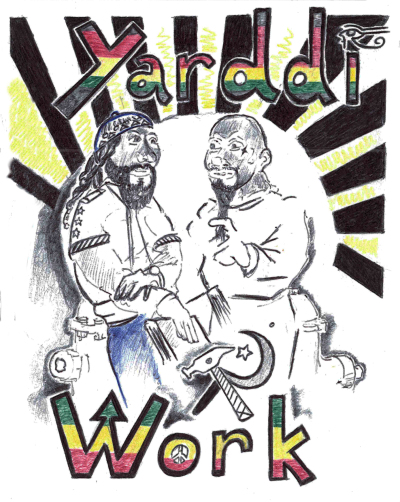[This letter is responding to the debate we printed in ULK 55:
”Debating
Theory, Building Unity for September 9 Protests”]
Let me try to run through this as quick as possible. To the point yo.
That
original
article in the ULK 50 was pretty half-assed. Admittedly, so
was
my
response to it.
So, first lemme say that there were a few typos in my response that made
some significant differences. Mainly I wanna be clear that it said I
don’t care about your “lies.” The correct word was “line.”
Also, I have no fuckin clue what “Post-Fordism” could possibly mean.
What the fuck is “Fordism”? I said “Post-Marxist”. We live in a
“Post-Marxist” era.
As for my acceptance of status quo definitions of “slavery”, I don’t
accept it simply because it’s what is commonly presented to us, but
because I more or less agree with it.
I do fully agree with your analysis concerning the exploited global
proletariat as being the theoretical primary contradiction. Capitalist
imperialism depends solely on expropriation of land and resources. In
order to sustain capitalist rule this can only come as a result of
perpetual expansion into foreign lands, etc., and not to mention
wholesale slaughter of oppressed peoples across the globe. Imperialism
being inherently nationalistic this means “global” class systems emerge
and so there you see our analysis is virtually identical.
Now if you can explain to me how we can apply this dialectically correct
analysis into revolutionary practice – aside from pencil-pushing while
capitalism further secures itself by snowballing into a fascist state –
sign me up. But in my studies of all revolutionary lines, I’ve yet to
find a red theory that institutes practice in our current material time
and place.
I’m a nihilist. I accept no theory/analysis simply because it’s common
to any rev camp, but only if it jives with absolute objective and
dialectically correct theo-analysis. I find red analysis to be
exceptionally on point. But I find major flaws in dictatorships of any
stripe based in historical evidence. Authority always shows to turn into
tyranny. Communists are just as guilty of mass-murder and oppression as
any fascist state and I find the differentiation between “nationalistic”
socialism and so-called “international” socialism to be mostly a matter
of semantics. Don’t get me started on Bolshevism being the theoretical
root of fascism, evidenced by Hitler’s distribution of Leninist
literature. So I’ll close this by saying red analysis is sound. But
fundamentally anarchist methodology and principles are the only
realistic road to a true egalitarian society. I don’t swallow this
because of identity politics – be it the black flag or the red – but
because it’s true. And so I apply red analysis to anarchist principles.
Next, obviously I do recognize the importance of line as my writing
clearly demonstrates. You make exactly the point of why it’s important
in your paragraph number five and others. When I say I don’t care about
line, what I mean is that I don’t conform to any line simply because
it’s a generally accepted body of politics. Though I will and do align
myself with any line if it jives with my correct social analysis,
theory, or mode of practice. In my case, red analysis, black theory
(black meaning anarchist).
Obviously I’m also a big fan of theory. Marxist dialectics being the
pinnacle of revolutionary science, this is my area of professionalism in
fact. So, when I told you “your theory is based in theory”, you omitted
the first part of my statement which was that black theory is based in
practice. So “anarchist theory is based in practice, red theory is based
in theory.” That was my statement, which demonstrates my ascription to
theoretical science. I simply see no potential for practical application
of red theory, and I’ve seen nothing from red camps that show otherwise.
Further, I say I don’t care about line, as in when I’m participating in
any revolutionary campaign – not political agenda, but revolutionary
campaign, which is different – I could really give a shit if you’re a
militant red or a backwoods biker for Christ. If you’re with the
business we’re crackin’ off then I’ll ride in the same car with you. Do
I dig your political line? That’s irrelevant during campaigns as long as
our interests intersect on the immediate issues. This is also what
Bakunin meant and myself when I quote him when he said in a letter to
his sister “sometimes you have to throw theory into the fire for it only
spoils life” – spoils, not “stalls” (another typo). We’re saying theory
that cannot be applied, no matter how sound, is worthless. At that time
he was still practicing Hegelian dialectics which is nihilistic in
nature. And then he went and got himself a political agenda and became
just as boring as Marx.
As I state in my original critique, your original article has a clear
contradiction in your dudes’ own analysis. The paragraph #5 and
paragraph #10 directly contradict each other. But whatever. As I said,
it was kinda half-assed and it’s a mostly irrelevant point within all
our other conversation on this shit. Ultimately I maintain my original
statement on this which you neglected only to reiterate the same point
which is that in refusing to participate in these pigs’ exploitative
practices, clearly I said “the P.I.C. will have to adjust to accommodate
us.” That does not even suggest a declaration that it will “close all
prisons.” For the record, I quoted a comrade from the Free Virginia
Movement when I said that.
Lastly in my own personal defense of nihilism, I find red political
agenda idealistic and historically and theoretically frightening and
horrific. Be that as it may, I actually find anarchist ideas about some
revolutionary end result of global economic syndications just as
whimsical, and frankly unfavorable as any other systemic socio-economic
structure. It’s basically just another formula based around labor and
industry and distribution of wealth and so on. It fails to bring into
question the value and dependence of labor and production in itself. So
ultimately it may be egalitarian in theory, which I align with in regard
to revolutionary practice in our current socio-economic landscape, as we
work from a decentralized organizational praxis. At the end of the day,
the idea is to still be subject to industry, and so becomes somewhat
mechanical and antithetical to the liberated spirit of the inherent
animal nature of humanity. Further, any system, be it hierarchical like
communism, or horizontal like anarchism, if it’s a system designed to
control the means of production, it is susceptible to corruption and a
gradual development toward the control of humans by the worst part of
other humans. In this case, the nihilist, rejecting all idealistic
political theory, will be just as likely to attack and destroy anarchist
syndicalism as she would any other system. That is, if it begins to be
corrupted – which it would.
And so what this means for the nihilist is that we look forward to
nothing but our cigarettes, our bitter coffee, and destruction.
I suppose I could go on and nit pick some more shit, but there’s no
point. I think we understand each other, and so I shall withdraw back
into the black coils of my madness. Feel free to reawaken me for
purposes of business or pleasure.
In the end, I hope I speak for everyone who gives a shit when I say I
look forward to solidifying an alliance with you – as I’ve done before –
for the coming tidal wave against the agony of oppression.
Face first in the fight for peace.
MIM(Prisons) responds: We appreciate Zero’s willingness to
continue the dialogue over our theoretical disagreements, and to build
our practical unity in the struggle against oppression in which we do
have much agreement. We want to reiterate that at this stage in the
struggle, we have more unity with Zero and other anarchists than we have
differences. We are all fighting to overthrow imperialism, and to take
on that enemy we need a united front of all the enemies of the
imperialist state. As Zero stresses that means uniting around the
battles of the day, despite ideological differences.
There’s no need to reiterate our responses to most of Zero’s points,
instead we want to take this opportunity to again comment on the
theoretical debate over anarchism vs. communism and what’s the best way
to achieve liberation for the world’s oppressed. As we’ve said before,
anarchists and communists are fighting for the same end goal: a world
where no group of people has power over any other group of people.
Contrary to how Zero phrases it above, saying communism is hierarchical
while anarchism is horizontal, anarchism is the communist’s ultimate
goal, we just disagree on how to get there. It is the getting-there
process where communists believe in the use of force and repression of
the oppressors.
This may seem like a theoretical and esoteric discussion that doesn’t
have much relevance to our day-to-day organizing. After all, we all know
that right now the imperialists hold the power, and in the context of
the prison struggle the criminal injustice system is a daunting and
powerful enemy that we are all struggling against in many arenas. We
aren’t close to a revolutionary situation in the United $tates today,
and so neither the communists nor the anarchists are in a position to
seize power tomorrow. But this theory informs our practice in the
struggle. Zero understands this and so stands firm in eir political
positions, weaving them into eir discussion of the September 9th
protests. In this we completely agree with Zero. In the long run this
theory will determine whether or not (and how quickly) we are successful
in overthrowing imperialism, which for many in the world is a life and
death battle.
As scientists, we look to history to inform us about the most effective
theory and strategy. Zero takes this same approach but draws different
conclusions from eir study of history. We disagree with Zero’s analysis
that there isn’t a significant distinction between communism and fascism
(ey wrote: “the differentiation between ‘nationalistic’ socialism and
so-called ‘international’ socialism to be mostly a matter of
semantics.”) Obviously Zero knows that fascism is an ideology that
promotes the oppression of certain groups of people to the benefit of
others, while communism promotes the end of oppression of groups of
people. But studying the historical practice of communist revolutions we
come to different conclusions from Zero. While capitalist propaganda
tries to convince us that communists are brutal and murderous dictators,
a careful study of Russian and
Chinese
history, from history books not written by capitalist apologists,
demonstrates otherwise.
First we will state the obvious: neither the Russian nor the Chinese
revolutions succeeded in implementing communism. Both reached a
socialist state and then were overthrown by state capitalists from
within. But during the years when they were implementing socialism and
building towards communism, both countries made tremendous contributions
to humynity. There are several important metrics we could look at here.
To name just a few important ones: (1) Lives saved from
feudalism/capitalism, i.e. people no longer starving to death, receiving
health care, etc. (2) Lives saved from fascist and imperialist
aggression, i.e. the Russian pivotal and central role in the defeat of
Hitler and the fascists in World War II, the Chinese support for
revolutionary movements around the world. (3) Advances made towards
communism, i.e. the Chinese Cultural Revolution as a historical advance
over the Russian implementation of socialism in terms of addressing the
issues of corruption in socialist state structures through mass
participation.
“The central problem with the critics of Stalin is that they do not
understand the historical time period he lived in and the real-world
choices that actually existed. Yes, he killed many people, too many even
according to himself. However, all his repression combined was small
compared with the lives he saved through the rapid and revolutionary
transformation of society that he carried out. The choice the USSR had
was not between liberal humyn-rights utopia on the one hand and tzarist
era backwardness on the other. As if to drill this point into thick
skulls, history has shown what happens after decades of criticism of
Stalin: regression so that millions today are dying for lack of
conditions that used to exist under Stalin almost 50 years ago! People
supporting ‘humyn-rights’ and attacking Stalin are responsible for far
more deaths than Stalin. That is evidence of the real world choices
being faced – not between utopia and Stalin but between the pro-Western
phony communists like Khruschev and Brezhnev and bourgeois politicians
like Yeltsin on the one hand and Stalin on the road of Marxism-Leninism
on the other hand. Stalin should be compared with other political
leaders and then his merits will stand clear.
“Middle-class people from the West focus much too much on dissidents and
not enough on causes of death such as food, clothing and basic medical
care being lacking. Even including the repression he carried out, Stalin
still doubled the life expectancy of his people. For this reason, polls
of Russians on their favorite past leaders continue to show Stalin as
the second most preferred leader of the past century, after Lenin.
Although Amerikkkans love Lincoln more than Russians love Stalin, Stalin
has a higher public acclaim than most U.S. presidents have amongst
Amerikkkans, according to the survey by the Public Opinion fund cited in
Pravda.” (From MIM Theory 6: The Stalin Issue)
Zero believes that humyn nature will inevitably lead to people seizing
power for persynal gain if a state remains. In some ways Zero is
correct. Zero’s conclusion is similar to what Maoists say about the
dangers of a new bourgeoisie arising within the party because of the
strong history and remnants of capitalist culture. People don’t just
magically change overnight, and some will try to take advantage of
opportunities to seize power and wealth even after a revolution. This is
why the Chinese communists initiated the Great Proletarian Cultural
Revolution: to encourage and foster the criticism of leadership by the
people so that leaders who become corrupt will be exposed and removed.
Communists believe that people are conditioned by their environment. We
have loads of historical evidence to support this. And so, like the
anarchists, we believe that if we can build a society where all people
are equal and all people’s needs are met, and where the culture doesn’t
encourage violence and power grabbing, but rather fosters cooperation
and kindness, people will learn and adapt into this more peaceful
existence. But unlike the anarchists, we don’t think this can be
implemented overnight. We will need a period where we have a state to
force the former-oppressor classes out of power and keep them from
taking that power back. We call this state the dictatorship of the
proletariat, because it is using the power of the state in the interests
of the oppressed. And during this time we will also be fighting against
new people trying to take and abuse power. During this period of
cultural revolution we will be remaking the culture while we are
transforming ourselves to think and work collaboratively, for the good
of all of humynity. People won’t just start doing this on a mass scale
spontaneously; it will take a long period of struggle against the
capitalist patriarchal culture. The Chinese communists made significant
strides, but we must continue to do more and better.
For people interested in going deeper into these questions we recommend
a few readings:
-
There is an entire theory journal written by MIM in 1994 about
Stalin,
along with other relevant articles and reviews. Get MIM Theory 6.
-
For a deeper look at the successes and failures of communism we
recommend MIM Theory 4, a theory journal by MIM, but also we distribute
many books by both communists and non-communists detailing their
experiences and observations in revolutionary China which provide
objective (non-bourgeois-propaganda) facts about the real successes and
struggles in that country under Mao.
-
We distribute several books and essays on the restoration of capitalism
in the USSR and China for a more in-depth study of that history.







 Alabama
Alabama
 Alaska
Alaska
 Arizona
Arizona
 Arkansas
Arkansas
 Army Post
Army Post
 California
California
 Colorado
Colorado
 Connecticut
Connecticut
 Delaware
Delaware
 District of Columbia
District of Columbia
 Federal
Federal
 Florida
Florida
 Georgia
Georgia
 Guam
Guam
 Hawaii
Hawaii
 Idaho
Idaho
 Illinois
Illinois
 Indiana
Indiana
 Iowa
Iowa
 Kansas
Kansas
 Kentucky
Kentucky
 Louisiana
Louisiana
 Maine
Maine
 Maryland
Maryland
 Massachusetts
Massachusetts
 Michigan
Michigan
 Minnesota
Minnesota
 Mississippi
Mississippi
 Missouri
Missouri
 Montana
Montana
 Nebraska
Nebraska
 Nevada
Nevada
 New Hampshire
New Hampshire
 New Jersey
New Jersey
 New Mexico
New Mexico
 New York
New York
 North Carolina
North Carolina
 North Dakota
North Dakota
 Ohio
Ohio
 Oklahoma
Oklahoma
 Oregon
Oregon
 Pennsylvania
Pennsylvania
 Puerto Rico
Puerto Rico
 Rhode Island
Rhode Island
 South Carolina
South Carolina
 South Dakota
South Dakota
 Tennessee
Tennessee
 Texas
Texas
 Utah
Utah
 Vermont
Vermont
 Virginia
Virginia
 Washington
Washington
 West Virginia
West Virginia
 Wisconsin
Wisconsin
 Wyoming
Wyoming


